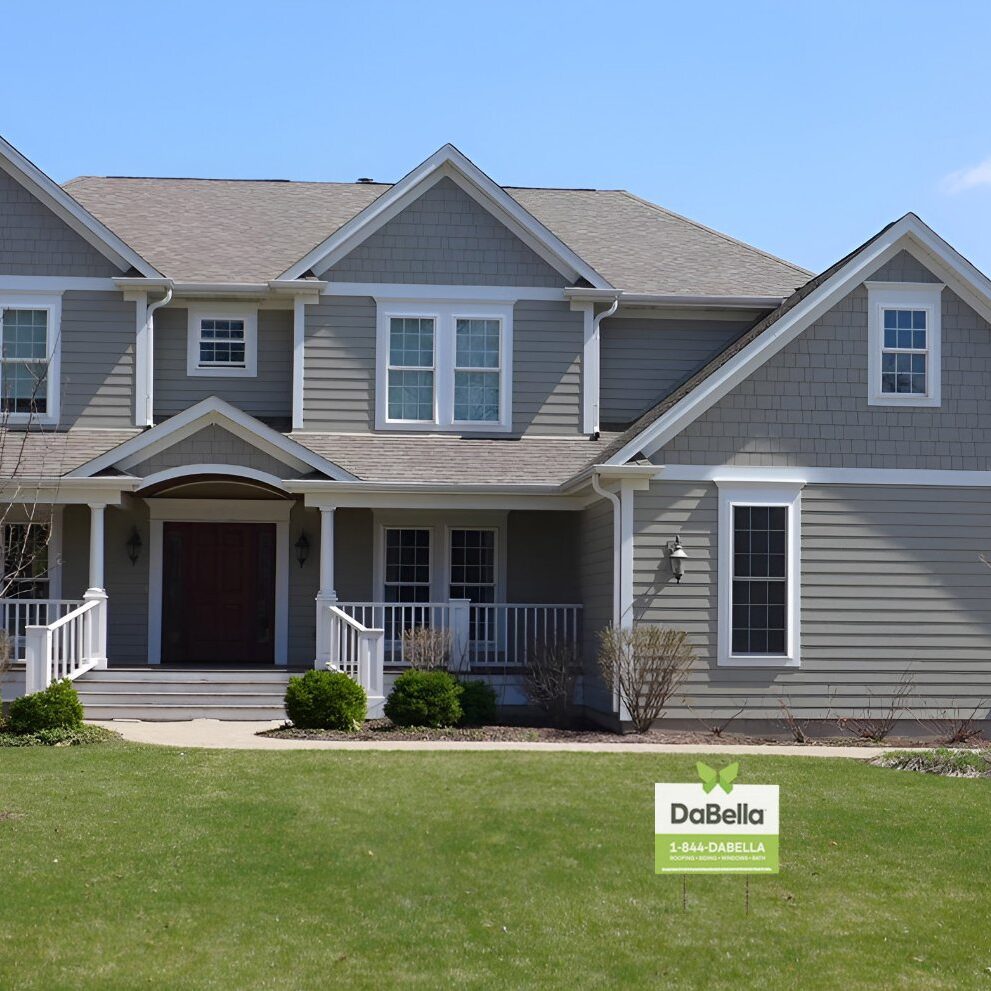When it comes to choosing the ideal siding for your California home, it is important to consider the state’s unique and varied climate. From the scorching heat of summer to the mild, rainy winters, California weather demands siding materials that can stand up to extreme temperatures, occasional storms, and long-term wear. Whether you are in a coastal area, a mountainous region, or the desert, your siding needs to be durable, weather-resistant, and low-maintenance to protect your home while maintaining its curb appeal. With so many options available, finding the right material can feel overwhelming, but making an informed decision will not only enhance your home’s energy efficiency and value but also ensure it withstands the test of time.
Here, we will take a closer look at California’s diverse weather patterns, explore the most popular siding materials, and discuss why James Hardie fiber cement siding stands out as a top choice. Plus, we will explain why DaBella is the trusted provider of siding replacement solutions for homeowners across California, offering expert installation and exceptional customer service.
How California’s Weather Impacts Your Choice of Siding Material
California’s diverse climate, ranging from the scorching heat of its deserts to the mild, foggy shores of its coast, presents unique challenges when it comes to choosing the right siding for your home. Understanding how the state’s weather conditions affect the performance of different siding materials is key to making a long-lasting, informed investment.
One of the most significant factors to consider is the wide temperature fluctuations experienced across California. In many areas, summers can be blistering hot, with temperatures exceeding 100°F, while winters can bring chilly temperatures, especially in higher elevations. These extremes can cause siding materials to expand and contract, leading to issues such as warping, cracking, or fading. Choosing a siding material that is both durable and flexible enough to withstand this temperature shift without compromising its integrity is essential to ensuring the long-term health of your home’s exterior.
In addition to temperature extremes, California’s prolonged dry seasons and increasing risk of wildfires make fire-resistant siding a critical consideration for homeowners. The state’s susceptibility to wildfires—exacerbated by drought conditions and high winds—means that selecting a fire-resistant siding material is not just a wise choice, it is a necessary step in safeguarding your home. Traditional wood siding, for example, is highly flammable and can quickly become a risk in fire-prone areas. On the other hand, fire-resistant materials like fiber cement or metal siding provide an added layer of protection by helping to prevent ignition and slow the spread of flames, giving you valuable time to react in the event of a fire.
Common Siding Types in California
Selecting the right siding for your California home involves considering climate, durability, and aesthetics. At DaBella, we offer a range of high-quality siding options perfect for the California environment. Let us examine three commonly used types:
Fiber Cement Siding
Fiber cement siding is a popular choice for California homeowners due to its durability and resistance to extreme weather. Composed of cement, sand, and cellulose fibers, this siding provides excellent protection against fire, pests, and rot. It also offers numerous design options, including various textures and colors, enabling you to achieve the ideal look for your home.
Stucco Siding
Stucco siding is a classic option well-suited to California’s climate. Made from cement, sand, and water, applied in multiple layers, stucco offers excellent insulation and is resistant to fire and pests. Its unique textured appearance adds charm and character to any home.
While stucco has long been a popular siding choice in California, particularly for Mediterranean-style homes, it presents several challenges in the state’s diverse climate. One of the key issues is its susceptibility to cracking due to temperature fluctuations. California’s hot summers and cool winters cause stucco to expand and contract, leading to visible cracks that can allow moisture to seep in. In areas with higher rainfall or humidity, this moisture can promote mold, mildew, and water damage, further compromising the siding’s integrity.
Additionally, stucco is a brittle material, making it vulnerable to damage during earthquakes—a significant concern in seismically active regions of California. The maintenance required to keep stucco in good condition, including regular sealing and repainting to prevent fading and water infiltration, can also be a burden for homeowners. With these factors in mind, stucco may not be the best option compared to other materials in areas subject to extreme temperatures, moisture, fire, or seismic activity.
Vinyl Siding
Vinyl siding offers several advantages for California homeowners. It is low maintenance, requiring little more than occasional cleaning to maintain its appearance, and unlike wood, it does not need to be repainted or stained. This makes it especially appealing in California, where the intense sun can cause paint to fade quickly, leading to higher maintenance costs. Vinyl also performs well in California’s varied climate, resisting cracking, warping, and fading even in the face of extreme summer heat or occasional rainfall. Its weather resistance makes it suitable for both coastal and inland areas.
Additionally, modern vinyl siding can be insulated, enhancing energy efficiency by reducing heat loss and helping to keep homes cooler in the summer and warmer in the winter. On the downside, vinyl siding has a few drawbacks. While it is durable, it is prone to physical damage, such as cracking or denting from high winds, falling branches, or accidental impacts. It is also less fire-resistant than some other materials, which can be a concern in fire-prone areas of California. Another downside is its aesthetic limitations; while vinyl comes in many colors, it can lack the texture and natural look of wood or stone, which some homeowners may prefer for curb appeal. Finally, vinyl is made from PVC, a plastic material with a significant environmental footprint, which may be a consideration for homeowners looking for more sustainable options.
Why James Hardie is the Best Siding for California
When selecting siding for your California home, durability and energy efficiency are key factors to consider. James Hardie Fiber Cement Siding offers a powerful combination of long-lasting protection, energy efficiency, ability to handle warm and cold temperatures and enhanced curb appeal, all wrapped up in stylish, customizable designs.
One of the standout features of James Hardie siding is its exceptional durability and customizable features. Built to withstand California’s diverse climate—from scorching summers to rainy winters—this siding is resistant to moisture, rot, and pests. Unlike vinyl or wood, it will not warp, crack, or fade over time. Thanks to its advanced technology and premium materials, James Hardie siding maintains its strength and beauty for years, providing reliable protection for your home.
Energy efficiency is another major benefit of James Hardie Fiber Cement Siding. Its unique composition acts as an insulating barrier, helping to reduce heat transfer and keeping your home comfortable year-round. By improving thermal resistance and minimizing air leakage, this siding can significantly reduce heating and cooling costs, making your home more energy-efficient and lowering your carbon footprint.
Beyond its functional benefits, James Hardie Fiber Cement Siding offers a wide variety of design options to match any aesthetic. Whether you prefer classic horizontal planks, bold vertical lines, or charming shingle patterns, there are countless colors, textures, and architectural styles to choose from. This flexibility allows you to find the perfect siding to complement your home’s look and increase its overall value.
FAQ: Siding in California
Is Vinyl Siding Allowed for California Homes?
Yes, vinyl siding is permitted in California. The California Building Standards Code (Title 24) provides regulations and guidelines for construction projects, including siding. While some areas may have additional restrictions, vinyl siding is generally allowed across the state.
Do You Need a Permit to Replace Siding in California?
Whether you need a permit to replace siding in California depends on the scope of your project. In most cases, a permit is not required for simple siding replacement. However, if there are structural changes or alterations involved, a permit may be necessary. To determine if a permit is needed for your specific project, it is recommended to check with your local building department or consult a professional siding contractor.
Why Choose DaBella for Siding in California
DaBella is the top choice for siding replacement services in California, understanding the region’s unique challenges. As a James Hardie Elite Preferred Contractor, DaBella offers the highest quality siding products designed to withstand California’s climate. James Hardie fiber cement siding is known for its durability, customizability, and low maintenance, making it ideal for California homeowners. We currently offer siding replacement services in San Diego, Placerville, and Sacramento areas.
We pride ourselves on exceptional customer service and satisfaction. Our experienced professionals provide personalized service, ensuring each customer’s needs are met. We listen to our customers, answer their questions, and guide them through the siding installation process.
One advantage of choosing DaBella is our local knowledge and understanding of California’s architectural styles and design preferences. Our team offers valuable insights and recommendations to help homeowners choose the right siding options that complement their homes and meet their specific requirements.
When you choose DaBella for your siding needs in California, you can trust that you are getting the best products and services. Our commitment to quality, our decade of experience transforming homes, and our customer satisfaction sets us apart from the competition. Contact us today at 844-DaBella.

